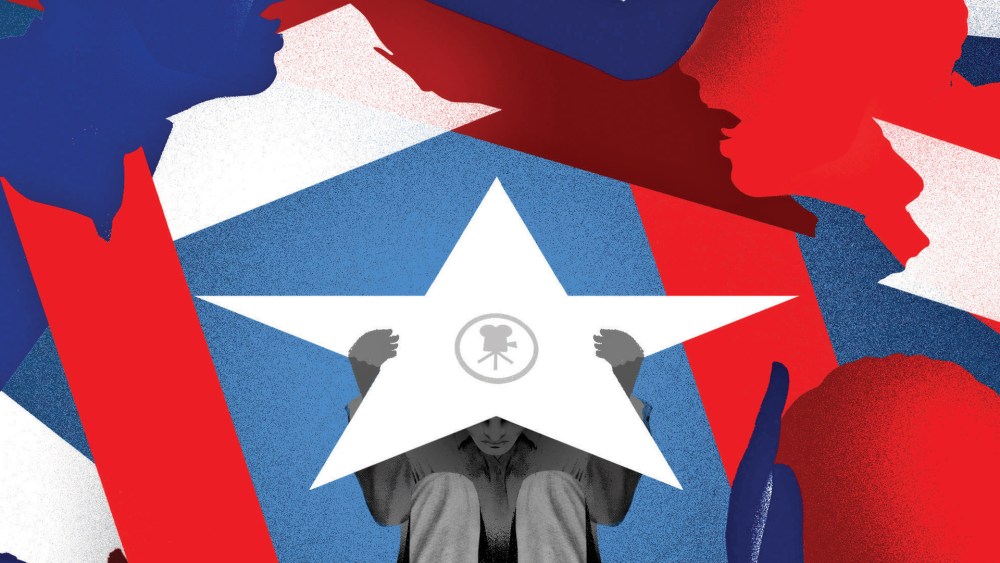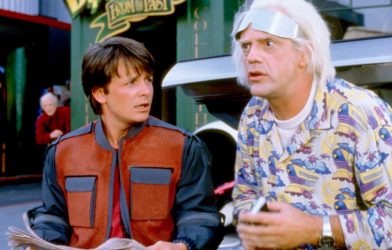“Civil War,” the A24 action-thriller about a violently divided United States, isn’t offering up much in the way of escapism. Though it takes place in the dystopian future, it not-so-subtly feeds into the blue-state/red-state rift that’s sure to widen as the race for the White House heats up.
That strategy is prominent in the movie’s patriotic-tinged marketing materials, which include a blood-soaked trailer featuring a missile that blows up the Lincoln Memorial, a poster of soldiers sandbagging the Statue of Liberty’s flame and references to successionist forces of California and Texas.
Yet elsewhere in Hollywood, movie studios are trying desperately to steer clear of promotional efforts that seem even remotely political — lest they find themselves unwittingly embroiled in a cultural firestorm. It’s a fair concern. Long before the country started preparing for one of the most polarizing presidential elections in its history, several movies were ensnared in partisan debates about creative choices they never predicted would spark controversy.
That was the case with Disney’s “The Little Mermaid” remake, which suffered blowback because of racist objections to the casting of Black actor Halle Bailey as Ariel. Ditto Pixar’s 2022 spinoff “Lightyear” (the offender was a same-sex kiss) and 2023’s “Barbie” (a cartoon map depicting Asia). In some instances, the provocation was accidental; in others, such as Disney’s animated “Strange World” (a fantasy adventure with a gay protagonist), attempts to be inclusive instead revealed dividing lines in public opinion.
Last summer’s “Sound of Freedom” was a surprise hit when conservative media groups rallied behind the film. But detractors of the Christian thriller about child sex trafficking accused it of stoking QAnon conspiracy theories. Yet for the most part, there’s no evidence that the perception of partisanship has an impact on ticket sales, at least in the U.S. (Internationally, “Barbie” wasn’t shown in territories that were offended by the cartography, and “Lightyear” and “Strange World” were banned in countries that censor LGBTQ content.) Still, political debates aren’t the kind of conversation that studios are hoping to inspire around the release of a film.
“I don’t think an overabundance of controversy is helpful,” says Peter Newman, head of the graduate dual degree program at NYU Tisch School of the Arts. “You can’t afford to lose 50% of people.”
Studios are, as a rule, cautious about ideas and elements in movies that could alienate audiences. But that trepidation is heightened during an election year, when politics can seep into movies whether Hollywood wants it to or not. And in 2024, the bitter partisanship that has fueled Donald Trump’s political career has only escalated as he faces a rematch with President Joe Biden. Consider that 65% of Americans say they feel exhausted when thinking about politics, according to a Pew Research Center poll — and it’s no surprise marketing departments have made a concerted effort to tread lightly with messaging or promotional campaigns that could be perceived as leaning one way or the other.
“It’s not worth it to make a joke that will make the left laugh but will alienate the right,” says one studio executive.
Movies can take eons to travel from inception to completion, so it’s impossible to anticipate the state of affairs by the time a film is ready to hit the big screen. Warner Bros. and Legendary Entertainment’s “Dune: Part Two” managed to side-step debate around its plotline, which integrates themes of religion, regional conflicts and the perils of cult-like worship of charismatic leaders. But internally, there was concern that audiences might react negatively at a time when such issues have renewed relevance both in the U.S. and in the Middle East, which finds itself embroiled in war.
“If people either legitimately or accidentally read a political bias in something, it screws up the marketing plan,” says Newman. “It was hard enough before people got extremely sensitive about every little thing.”
Some filmgoers turn to the movies as an escape from the headlines and the barrage of election ads on television. But studios may be laying off all marketing efforts in the weeks before or after the election. Tom Hardy’s superhero sequel “Venom: The Last Dance” was slated to debut on Nov. 8, but Sony recently moved up its release to Oct. 25. Now, no major movies are on the calendar for the first week of November, and there won’t be another tentpole until “Gladiator 2” on Nov. 22, followed by “Wicked” and “Moana 2” on Nov. 27.
“It’s going to be a quiet time in terms of releasing new material. You’ll be drowned out by noise and people won’t be paying attention,” says the studio executive. “Anything opening the week of the election, good luck. It’ll be hard to break through.”
As for “Civil War,” which doesn’t take sides in its futuristic American conflict, analysts believe commercial viability won’t rise or fall on the political nature of the film.
“If it succeeds, I think it will be because of action, thrills and violence,” says David A. Gross of movie consulting firm Franchise Entertainment Research. “In general, I think if you get too on the nose with politics, it’s off-putting.”









